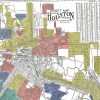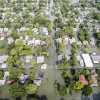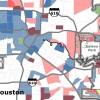As affordability wanes, Houston and Harris County renters face crowding, cost burdens
URBAN EDGE : June 22, 2021
The Kinder Institute’s second annual “State of Housing” report comes as Houston—and much of the country—remains in the midst of a residential real estate bonanza. A yearlong buying spree, fueled by a combination of factors, is driving the country to historically low inventory levels and propelling prices ever higher.
Black community, the moment to value ourselves is now
URBAN EDGE : April 27, 2021
“One callous white police officer convicted does not signal the demise of anti-Blackness. Her talons are embedded deeply in this nation’s flesh. It is like putting a $100 down payment on a $100 million house. It is progress, but you might want to hold off on scheduling the housewarming party.”
Coming out of the pandemic, how can cities counter 2020’s sharp rise in homicides?
URBAN EDGE : April 9, 2021
Among 34 large cities studied, homicide rates increased almost 30% last year, compared to 2019. Reasons for the shocking spike relate in large part to the pandemic and its societal impacts, but the killing of George Floyd may have been a contributing factor as well. Evidence-based approaches and committed elected officials will be key to reducing violent crime in American cities going forward.
Mapping inequity in Houston’s COVID-19 vaccination rollout
URBAN EDGE : February 14, 2021
Like many resources in Houston, access to the COVID-19 vaccine is concentrated on the west side of the city, while the greatest need and impact of the disease is concentrated among the residents on the east side.
A data-driven approach to combating food insecurity worsened by COVID-19
URBAN EDGE : December 13, 2020
In August, Urban Harvest launched its mobile market to bring healthy and affordable food options to underserved areas with limited access to fresh fruits and vegetables. The nonprofit collaborated with the Kinder Institute’s Houston Community Data Connections to create a data-based decision support tool that helps ensure the mobile market is being dispatched to areas of Houston where residents need it the most.
House Bill 5 may create separate and unequal college paths for Texas students
URBAN EDGE : November 30, 2020
Differences in course requirements across endorsements appear to provide some students a more direct path to selective four-year colleges and universities than other endorsements. What can school districts in Texas do to help students and families deal with these discrepancies?
An economist makes the case for school integration
URBAN EDGE : October 20, 2020
Contrary to popular opinion, efforts to integrate schools in the 1970s and 1980s were overwhelmingly successful, says economist Rucker C. Johnson. Johnson argues that we must renew our commitment to integration for the sake of all Americans.















